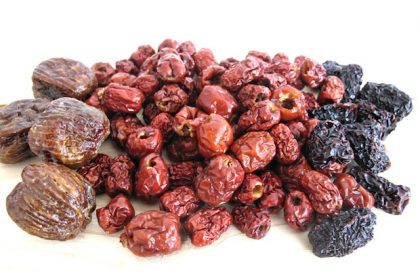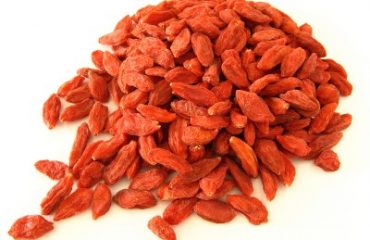Red Dates: The Healthiest Fruit on Earth

Health benefits of dates
- Wonderfully delicious, dates are one of the most popular fruits packed with an impressive list of essential nutrients, vitamins, and minerals that are required for normal growth, development and overall well-being.
- Tonifying Blood (The dates can improve anemia for women.) : Dates are an excellent source of iron, carry 0.90 mg/100 g of fruits (about 11% of RDI). Iron, being a component of hemoglobin inside the red blood cells, determines the oxygen-carrying capacity of the blood. The iron contained in dates can effectively improve the anemia caused by the menstruation and delivery. The cyclic adenosine monophosphate contained in dates can even adjust the metabolism and accelerate the reproduction of new cells. Therefore, the dead cells can be removed quickly and the hematopoiesis of bone marrow can be strengthened. Thus, the anemia can be improved fundamentally.
- Healthier Skin: The adequate intake of red dates can solve various skin problems and strengthen the elasticity for the human skin. The vitamin C and vitamin P contained in the dates can enhance the skin elasticity and enrich the subcutaneous tissues, which can make the skin become tender and smooth. In addition, the vitamin C can even resist oxidation and prevent the accumulation of melanin inside the human body so as to decrease the wrinkles.
- Fresh dates compose of soft, easily digestible flesh and simple sugars like fructose and dextrose. 100 g of mejdool dates hold 277 calories. When eaten, they replenish energy and revitalize the body instantly. For these qualities, they are being served to break the fast during Ramadan month since ancient times.
- The fruit is rich in dietary fiber, which prevents LDL cholesterol absorption in the gut. Additionally, the fiber works as a bulk laxative. It, thus, helps to protect the colon mucous membrane from cancer-causing chemicals binding to it in the colon.
- They contain health benefiting flavonoid polyphenolic antioxidants known as tannins. Tannins are known to possess anti-infective, anti-inflammatory, and anti-hemorrhagic (prevent easy bleeding tendencies) properties.
- They are moderate sources of vitamin-A (contains 149 IU per 100 g), which is known to have antioxidant properties and essential for vision. Additionally, it is also required maintaining healthy mucus membranes and skin. Consumption of natural fruits rich in vitamin A is known to help protect from lung and oral cavity cancers.
- Zea-xanthin is an important dietary carotenoid that selectively absorbed into the retinal macula lutea, where it thought to provide antioxidant and protective light-filtering functions. It thus offers protection against age-related macular degeneration, especially in elderly populations.
- Further, they are an excellent sources of potassium. 100 g contains 696 mg or 16% of daily-recommended levels of this electrolyte. Potassium is an important component of cell and body fluids that help regulate heart rate and blood pressure. They, thus, offers protection against stroke and coronary heart diseases.
- Date fruits are also rich in minerals like calcium, manganese, copper, and magnesium. Calcium is an important mineral that is an essential constituent of bone and teeth, and required by the body for muscle contraction, blood clotting, and nerve impulse conduction. Manganese is used by the body as a co-factor for the antioxidant enzyme, superoxide dismutase. Copper is required for the production of red blood cells. Magnesium is essential for bone growth.
- Further, the fruit has moderate levels of B-complex group of vitamins as well as vitamin K. It contains very good amounts of pyridoxine (vitamin B-6), niacin, pantothenic acid, and riboflavin. These vitamins are acting as cofactors help body metabolize carbohydrates, protein, and fats. Vitamin K is essential for many coagulant factors in the blood as well as in bone metabolism.



